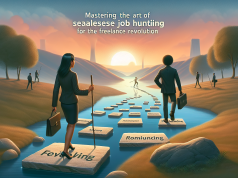As the digital age accelerates and the gig economy blooms, the traditional concept of work morphs into something more fluid, more flexible, and, for many, more appealing. In New York, a city that thrives on change and innovation, these shifts resonate with the workforce in profound ways. The rise of freelancing heralds a new dawn for workers and employers alike, requiring a thoughtful navigation through its burgeoning realities.
The freedom from a nine-to-five job and the choice to pick projects aligned with one’s skills and interests is attracting a growing number of New Yorkers to the freelancing lifestyle. The gig economy’s allure lies in its promise of autonomy and the opportunity to craft a work-life balance previously unattainable for many. However, this new frontier is not without its perils. Freelancers often grapple with the lack of job security, inconsistent income, and the absence of traditional employment benefits such as health insurance, retirement plans, and paid leave.
For employers, integrating freelancers into their workforce presents both challenges and opportunities. Companies can tap into a diverse pool of talent on an as-needed basis, scaling their operations up or down with greater agility. Yet, building a stable and committed team becomes a puzzle, with the transient nature of a freelancer’s engagement potentially affecting team cohesion and project continuity.
In the New York job market, the shift towards freelancing also raises pertinent questions about workers’ rights. The protections that employees typically enjoy are not guaranteed for independent contractors. This discrepancy has sparked a conversation about potential regulations and policies that could provide a safety net for freelancers, including mechanisms for wage security, dispute resolution, and fair contracting practices.
The future of freelancing is inevitably tied to the evolution of the workplace itself. As companies reassess their operational models, the integration of freelancers must be done with a forward-thinking approach that addresses the needs of the business while also safeguarding the interests of the gig workers. This involves fostering an environment where freelancers feel valued and included, establishing clear communication channels, and ensuring fair compensation.
New York, a city that has long been a barometer for global trends, is at the forefront of this evolving work landscape. How it responds to the challenges and opportunities presented by the gig economy will have far-reaching implications for workers and businesses nationwide.
The conversation surrounding the future of freelancing is not a mere whisper—it is a loud, pressing dialogue that calls for action from policymakers, business leaders, and the freelancers themselves. As we navigate these new realities, we must prioritize a balance that honors the entrepreneurial spirit of freelancing while building a framework that supports the stability and growth of this critical segment of the workforce.




























